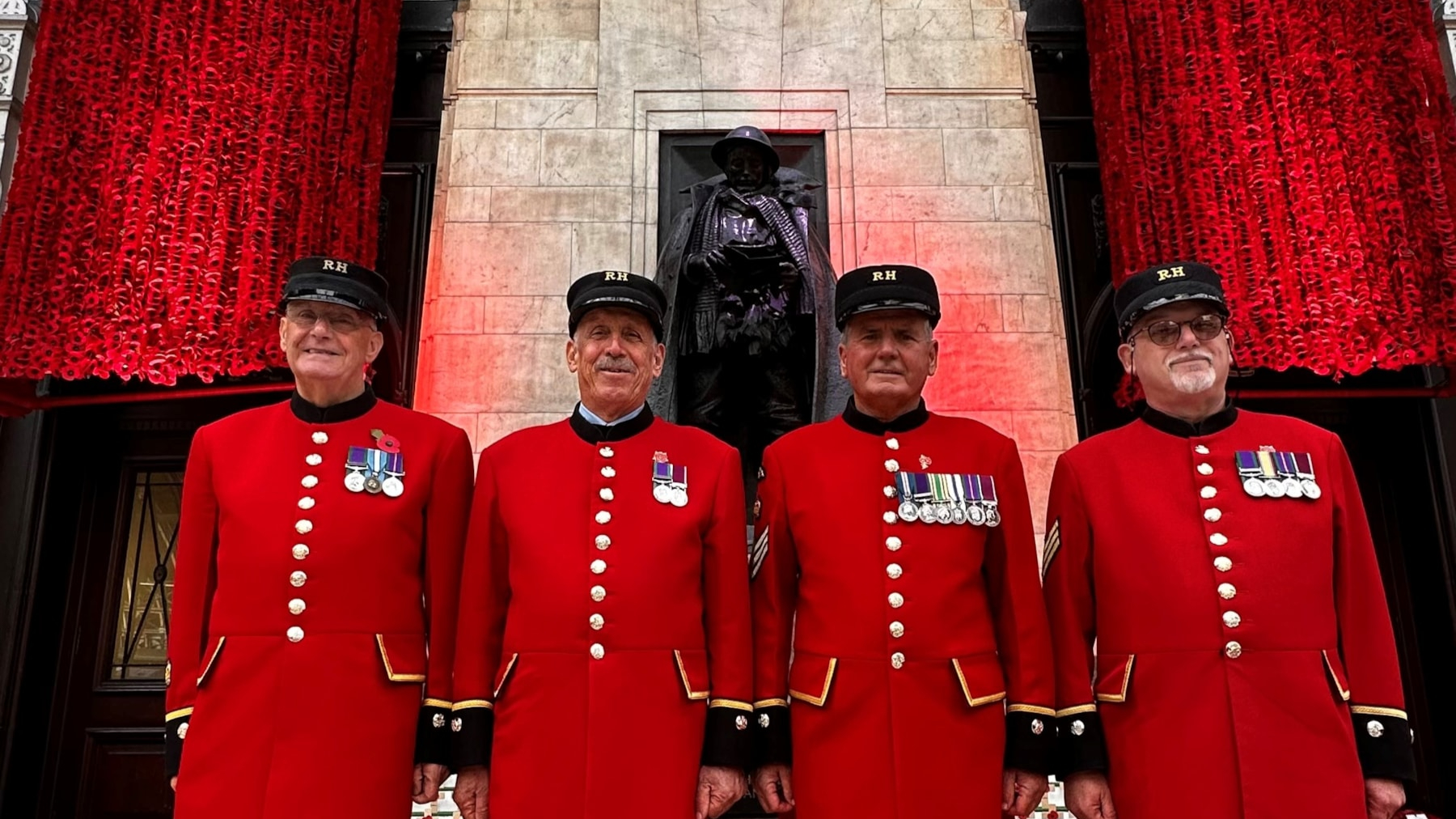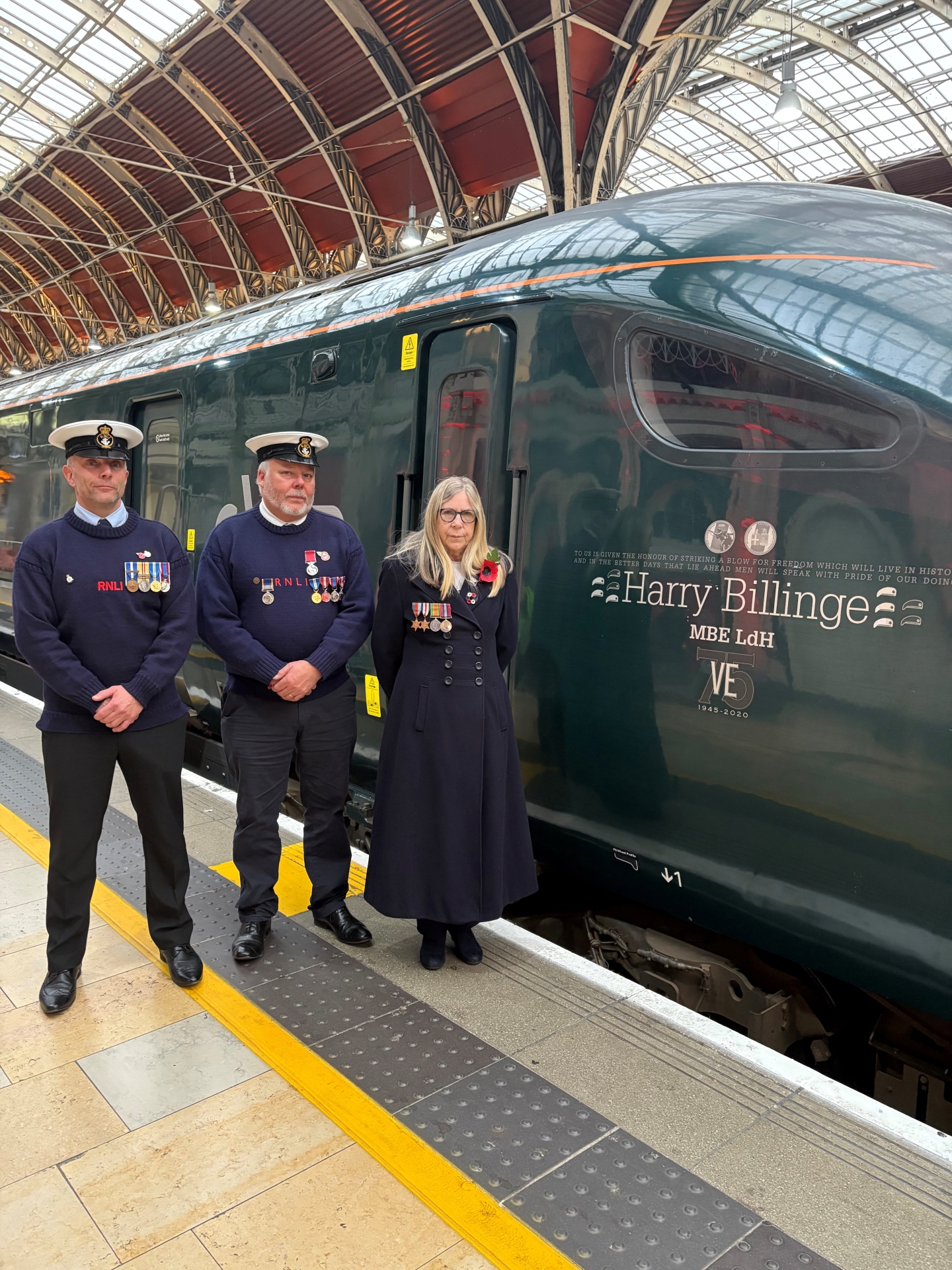
The impressive backdrop of poppy petals. Image: Great Western Railway
A display of 22,442 cascading poppy petals formed an impressive backdrop for a special D-Day tribute in Paddington station.
Great Western Railway (GWR) transported hundreds of wreaths to London to commemorate the Royal National Lifeboat Institution (RNLI) in honour of the contributions and sacrifices made by its volunteer crews during wartime.
This event marked the fifth annual Poppies to Paddington operation on Armistice Day (Monday, November 11).
A wreath was collected from Paignton station at 6.34am and travelled along the Riviera Line until it reached Exeter St Davids at 7.39am.
The petals were recycled from wreaths collected during previous Poppies to Paddington ceremonies and draped from balconies either side of the iconic war memorial on Platform 1 at Paddington station.

Above: Chelsea Pensioners alongside the iconic war memorial at London Paddington. Image: GWR
They represent the number of service personnel under British command who died during D-Day and the Battle of Normandy in 1944.
Once again working with The Veterans Charity, Poppies to Paddington featured 10 GWR services carrying hundreds of wreaths from communities across the network. On arrival in London, the wreaths were laid at the war memorial ahead of a Service of Remembrance.
Among those attending the service was Margot Billinge, daughter of D-Day veteran and Normandy Memorial Trust fundraising hero Harry Billinge MBE, who passed away in 2022.
GWR named Intercity Express Train 802006 in Harry’s honour in 2020, and Margot travelled from her home in St Austell, Cornwall, to greet the train as it arrived on Platform 1.
As well as marking the 80th anniversary of D-Day, Poppies to Paddington also celebrated GWR’s special partnership with the Royal National Lifeboat Institution, which this year is marking 200 years of saving lives at sea.

Above: Margot Billinge with RNLI representatives Dave Nicoll and Simon Jeffery. Image: GWR
RNLI volunteers from across the GWR network—including many former service personnel—joined the operation by placing commemorative wreaths on board early-morning services on Monday, November 11, at 90 stations along the route.
The wreaths were accompanied by RNLI military veterans Simon Jeffery, coxswain at Plymouth RNLI, and Tony Rendle, mechanic at Penlee RNLI, who both attended the service at Paddington.
Joining them was Gaynor Williams, an RNLI Education and Water Safety volunteer who organised a knitathon with volunteers knitting enough poppies to make a large knitted poppy wreath.
GWR Operations Director, Richard Rowland, said: “We were really proud to partner with the RNLI earlier this year as part of its celebrations marking 200 years of saving lives at sea, and it’s wonderful they’re supporting our fifth Poppies to Paddington operation.
“Poppies to Paddington involved 10 train services covering the length and breadth of the Great Western network, including the use of our Night Riviera sleeper service from Penzance for the first time, and it was another poignant occasion at London Paddington.”
-1731414256093.jpg)
Above: A moment for reflection at Swindon station. Image: GWR
RNLI Chief Executive, Peter Sparkes, said: “We are deeply honoured to be part of the Poppies to Paddington service this year. With so many of our lifeboat stations and inland fundraising branches located along the GWR network, it’s a fitting way for our volunteers to participate in this national Act of Remembrance alongside the Armed Forces.
“The wreaths placed onboard represent our RNLI communities who save lives at sea, honouring those crew who have made the ultimate sacrifice over the past 200 years of the RNLI, including World War One and Two.”
During the First World War, many young lifeboat crew members left their stations to fight, causing the average age of the lifeboat crews left at home to increase to over 50. During the war years (1914-18), RNLI lifeboats launched 1,808 times, saving 5,332 lives.
In 1939, lifeboat volunteers were called away again to war. Nevertheless, by the end of the Second World War in 1945, RNLI crews had saved 6,376 lives around the coasts of Britain and Ireland.
Subscribe or register today to discover more from DonegalLive.ie
Buy the e-paper of the Donegal Democrat, Donegal People's Press, Donegal Post and Inish Times here for instant access to Donegal's premier news titles.
Keep up with the latest news from Donegal with our daily newsletter featuring the most important stories of the day delivered to your inbox every evening at 5pm.